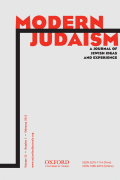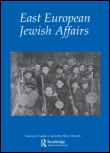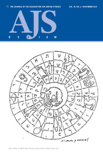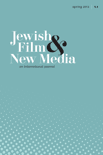
JOURNAL OF JEWISH THOUGHT & PHILOSOPHY
metrics 2024
Advancing Critical Discourse in Jewish Thought
Introduction
The JOURNAL OF JEWISH THOUGHT & PHILOSOPHY, published by BRILL, stands as a significant academic resource since its inception in 1993. With the ISSN 1053-699X, this interdisciplinary journal uniquely bridges various fields including Literature and Literary Theory, Philosophy, and Religious Studies, providing a platform for rigorous exploration of Jewish intellectual traditions and their broader cultural implications. Holding esteemed rankings across multiple categories, including Q1 in Literature and Literary Theory and Q2 in Philosophy, the journal appeals to researchers and scholars worldwide. The journal is not open access but is available through numerous academic libraries, making it accessible to those dedicated to advancing knowledge in Jewish thought. By fostering critical discourse and innovative scholarship, it remains an essential resource for understanding complex intersections of faith, ethics, and society from a Jewish perspective.
Metrics 2024
 0.17
0.17 0.20
0.20 0.40
0.40 10
10Metrics History
Rank 2024
Scopus
JCI (Web Of Science)
Quartile History
Similar Journals

MODERN JUDAISM
Advancing Understanding of Jewish Identity and PracticeMODERN JUDAISM is a premier journal dedicated to the multifaceted exploration of Jewish culture, history, and religious practice, providing a significant platform for scholarly discourse since its inception in 1981. Published by Oxford University Press Inc in the United States, this journal stands out with its diverse engagement across disciplines, reflected in its commendable 2023 category quartiles: Q2 in Cultural Studies and History, Q1 in Religious Studies, and notable rankings in Political Science and Sociology. With an impact factor that underscores its rigorous peer-review process and scholarly relevance, MODERN JUDAISM serves as an essential resource for researchers, professionals, and students alike, fostering an academic environment conducive to innovative ideas and comprehensive studies. Although not open access, the journal remains crucial for anyone looking to deepen their understanding of contemporary Jewish thought and its intersection with broader cultural and political currents. For further inquiry or submissions, please refer to the Journals Department at 2001 Evans Rd, Cary, NC 27513.

Tradition-A Journal of Orthodox Jewish Thought
Bridging Past Wisdom with Present ChallengesTradition: A Journal of Orthodox Jewish Thought is a prestigious academic journal published by the Rabbinical Council of America, dedicated to the exploration and analysis of Orthodox Jewish thought and its implications on contemporary issues. With a legacy dating back to 1973, this journal serves as a crucial platform for scholars, theologians, and students interested in the rich tapestry of Jewish philosophy, law, and ethics. Although it does not offer open access, its thoughtful, peer-reviewed articles are essential for advancing knowledge in Jewish academia and fostering dialogue within the broader cultural context. As an authoritative voice in the field, Tradition invites submissions that challenge, inform, and inspire further inquiry into the complexities of Jewish tradition, ensuring that it remains at the forefront of scholarly discussion.

East European Jewish Affairs
Connecting Past and Present: Insights into East European Jewish CommunitiesEast European Jewish Affairs is a prominent scholarly journal published by Routledge Journals, Taylor & Francis Ltd, dedicated to exploring the intricate historical, cultural, and political dynamics of Jewish communities in Eastern Europe. With ISSN 1350-1674 and E-ISSN 1743-971X, this journal has been a critical platform for academic discourse since its inception in 1992, resuming publication after a hiatus in 2005. Although it is not an open-access journal, it provides vital insights into Jewish studies, engaging researchers, professionals, and students alike with in-depth analyses and discussions. The journal currently holds a Q4 ranking in multiple categories, including Cultural Studies, History, and Political Science and International Relations, reflecting its niche yet significant contribution to these fields. The 2023 Scopus rankings position it within the 34th percentile in History and the 10th percentile in Political Science, evidencing its specialized focus and the evolving nature of Jewish studies. For those investigating the unique social and cultural trajectories of East European Jewish communities, East European Jewish Affairs serves as an essential resource.

AJS Review-The Journal of the Association for Jewish Studies
Bridging Disciplines for a Comprehensive Understanding of Jewish StudiesAJS Review - The Journal of the Association for Jewish Studies is a leading academic journal published by the University of Pennsylvania Press, dedicated to advancing scholarship in Jewish studies. With its ISSN 0364-0094 and E-ISSN 1475-4541, the journal offers a rich compendium of research from various disciplines, including cultural studies, history, literature and literary theory, and religious studies. Recognized within the Q2 and Q3 quartiles across multiple categories in 2023, AJS Review provides an esteemed platform for academics to disseminate innovative ideas and engage with critical issues relevant to Jewish history and culture from 1976 to 2024. Although not an open-access journal, it ensures that high-quality, peer-reviewed articles are available to a global audience, enabling researchers, professionals, and students to foster deeper insights into Jewish narratives and heritage. By promoting interdisciplinary dialogue, AJS Review is integral to the academic community, offering valuable contributions to our understanding of Jewish studies and its broader implications.

Kwartalnik Historii Zydow-Jewish History Quarterly
Celebrating the Depth and Diversity of Jewish ExperiencesKwartalnik Historii Żydów - Jewish History Quarterly is a dedicated academic journal published by the esteemed Jewish Historical Institute in Warsaw, Poland. With an ISSN of 1899-3044, this quarterly publication serves as a vital platform for scholarly discourse on Jewish history, culture, and heritage. The journal aims to reflect the diversity and complexity of Jewish experiences across historical contexts, making it an essential resource for researchers, professionals, and students in the fields of History, Religious Studies, and Cultural Studies. Despite its recent coverage discontinuation in Scopus from 2012 to 2015, the journal's rankings within its respective categories indicate a modestly engaged readership and potential for contribution, particularly seen in its ranks of 339/388 in Religious Studies and 859/975 in History. Although the journal operates on a non-open access basis, its curated articles enrich the understanding of Jewish narratives and interactions within broader socio-cultural frameworks, underlining its importance in promoting historical knowledge and cultural appreciation.

ZEITSCHRIFT FUR RELIGIONS-UND GEISTESGESCHICHTE
Investigating the Intersections of Culture, Faith, and IdeologyZEITSCHRIFT FUR RELIGIONS-UND GEISTESGESCHICHTE is a prominent academic journal published by BRILL, focusing on the intricacies of religious and intellectual history. Since its inception in 1929, this journal has provided a key platform for scholarly discourse, offering insights into the historical evolution of religious beliefs and philosophical thought. Although it currently holds a Q4 ranking in the fields of History, Philosophy, and Religious Studies according to the 2023 category quartiles, it serves as an important resource for researchers and students alike who are engaged in these disciplines. With an ISSN of 0044-3441, the journal strives to foster academic dialogue and critical analysis, contributing to the understanding of how religious and philosophical ideologies shape human experience. The journal is based in Leiden, Netherlands, and while it does not currently offer open access, it supports the academic community by providing essential research articles that are invaluable for those exploring the intersections of faith, culture, and thought.

Quest-Issues in Contemporary Jewish History
Exploring the Rich Tapestry of Contemporary Jewish HistoryQuest - Issues in Contemporary Jewish History is a pivotal open-access journal published by the Fondazione Centro Documentazione Ebraica Contemporanea in Italy. Since its inception in 2010, this journal has been dedicated to the scholarly exploration of the multifaceted dimensions of contemporary Jewish history, making significant contributions to the fields of history and cultural studies. With an ISSN of 2037-741X, it serves as a vital platform for researchers, professionals, and students alike, providing access to an array of insightful articles and research findings. As of 2023, it holds a respectable Q3 ranking in the History category within Scopus, indicating its growing influence in academia, alongside a rank of #899 out of 1760 in Arts and Humanities – History. This makes it an essential resource for those looking to deepen their understanding of Jewish history in a contemporary context. The journal, with its rich scholarly outputs converging from 2017 to 2023, is based in Milan and strives to foster high-quality research in Jewish studies.

European Journal of Jewish Studies
Unveiling New Perspectives on Jewish Heritage and ScholarshipEuropean Journal of Jewish Studies is a distinguished academic publication that offers a comprehensive platform for scholarly inquiry into Jewish studies, addressing critical intersections with cultural studies, history, literature, and religious studies. Published by BRILL, a leading academic publisher based in the Netherlands, this journal boasts a robust reputation supported by its impressive rankings and quartile classifications—Q3 in Cultural Studies, Q3 in History, Q2 in Literature and Literary Theory, and Q3 in Religious Studies as of 2023. With its convergence years spanning from 2007 to 2024, the journal serves as a vital repository of research that navigates the complexities of Jewish identity and culture through interdisciplinary lenses. Although it does not operate under an open access model, the journal's rigorous peer-review process ensures the publication of high-quality research essential for students, professionals, and academics alike. Engaging with this journal opens up pathways for critical dialogue and innovative contributions to the field, making it an essential resource for those invested in the rich tapestry of Jewish studies.

Review of Rabbinic Judaism
Charting the Evolution of Rabbinic JudaismReview of Rabbinic Judaism is a distinguished academic journal published by BRILL, focusing on the intricate history and development of Rabbinic Judaism from its origins to contemporary implications. Since its inception in 1998, it has catered to a broad audience of researchers, professionals, and students interested in the historical and religious dimensions of Judaism. The journal is currently recognized within the Q2 category in both History and Religious Studies as of 2023, indicating its significant role in scholarly discourse. Although it is not an Open Access journal, it remains accessible through various academic institutions and libraries globally. The journal's broad scope allows for diverse articles that explore theological, cultural, and textual analysis, making it a vital resource for those dedicated to the study of Jewish texts and traditions. Located in the Netherlands, Review of Rabbinic Judaism continues to contribute to the academic landscape by fostering a deeper understanding of Rabbinic thought.

Jewish Film & New Media-An International Journal
Chronicling the Evolution of Jewish Narratives in Film and New MediaJewish Film & New Media: An International Journal, published by Wayne State University Press, serves as a crucial platform for scholars and practitioners within the realms of Film Studies, Jewish Studies, and Media Studies. Since its inception, the journal has explored the intersection between Jewish culture and cinematic representation while also addressing contemporary media narratives. With an ISSN of 2169-0324 and E-ISSN 2169-0332, it is indexed in major databases, showcasing solid rankings in various disciplines, including a commendable Q2 rank in Visual Arts and Performing Arts. Despite its current Q4 categorizations in Anthropology and Communication, the journal is noted for its engaging contributions that sow rich discussions about Jewish identity, filmic expression, and media representation. Researchers and students alike benefit from the journal’s wealth of interdisciplinary scholarship, which spans converged years from 2013 to 2017 and 2019 to 2022, ensuring a robust timeline of critical inquiry. As an essential resource for understanding the nuances of Jewish film and new media, this journal occupies a unique niche, inviting contributions that push the boundaries of current academic dialogue.